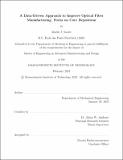A Data-Driven Approach to Improve Optical Fiber Manufacturing: Focus on Core Deposition
Author(s)
Sardet, Maëlle J.
DownloadThesis PDF (13.90Mb)
Advisor
Anthony, Brian W.
Terms of use
Metadata
Show full item recordAbstract
This thesis presents an in-depth investigation on characterization of optical fiber preform core manufacturing and the identification of underlying trends in measured production data. While walking through the different operations involved in the process, we explained the challenges associated with insuring refractive index profile precision and glass purity. Starting with unsupervised learning, process by process, we applied linear and non linear dimensionality reduction algorithms (PCA and t-sne) to features matrices created from time series data and have been able to connect data clusters with context information like machines or month of the year. Then considering the core fabrication process as a whole, we studied the propagation of trends in the data sets up to quality measurements using Dice’s statistic to gauge similarities between samples sets. Finally, we developed some data-driven regression models in order to predict the refractive index measured at the end using data from all processes. As a result, Kernel algorithms performed the best and almost as well on raw statistics from all processes as on encoded information about machine sequences and dates. This supervised approach demonstrated some great potential for the development of prediction tools which could help design the optimized production line. An underlying objective is to support Sterlite Technologies Limited in using data-driven approach applied to process control for its plant in Waluj and Shendra starting by implementing good practices for variables measurement, logging and tracking.
Date issued
2023-02Department
Massachusetts Institute of Technology. Department of Mechanical EngineeringPublisher
Massachusetts Institute of Technology